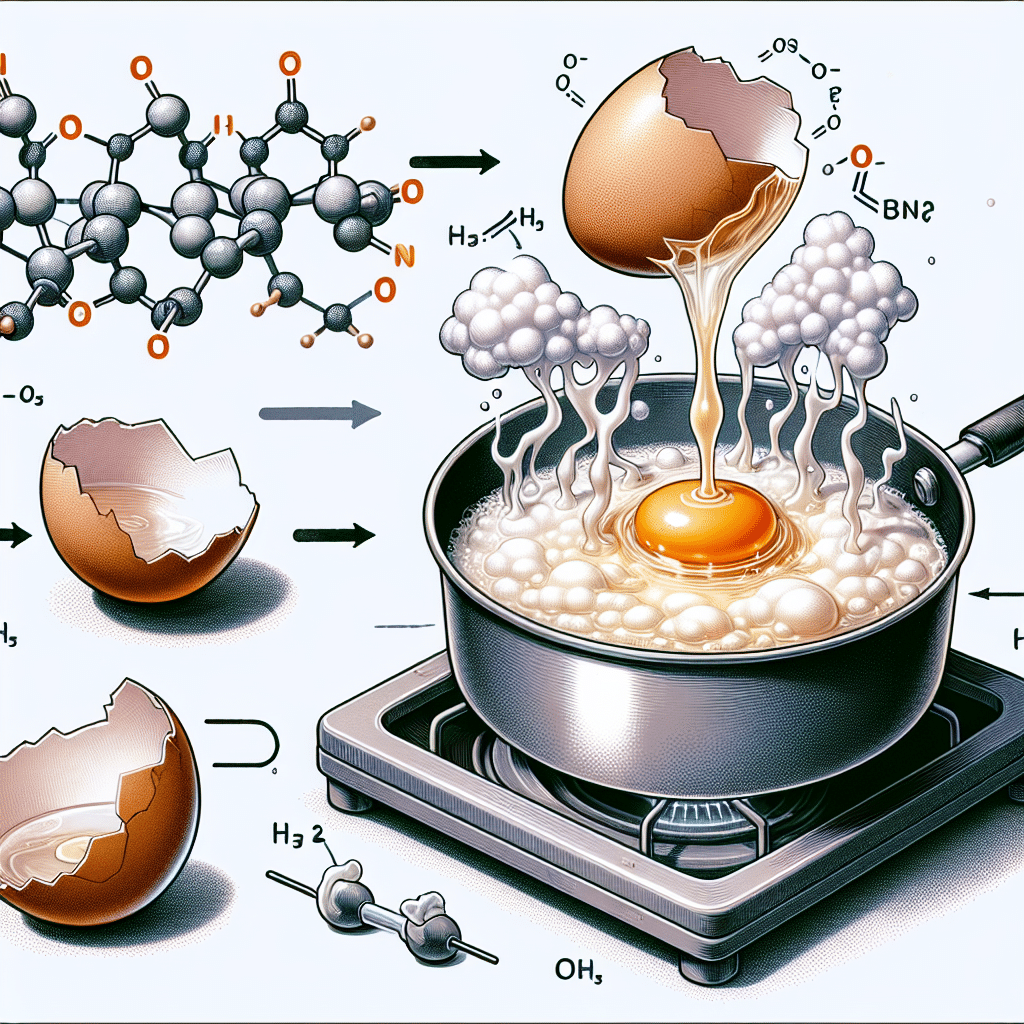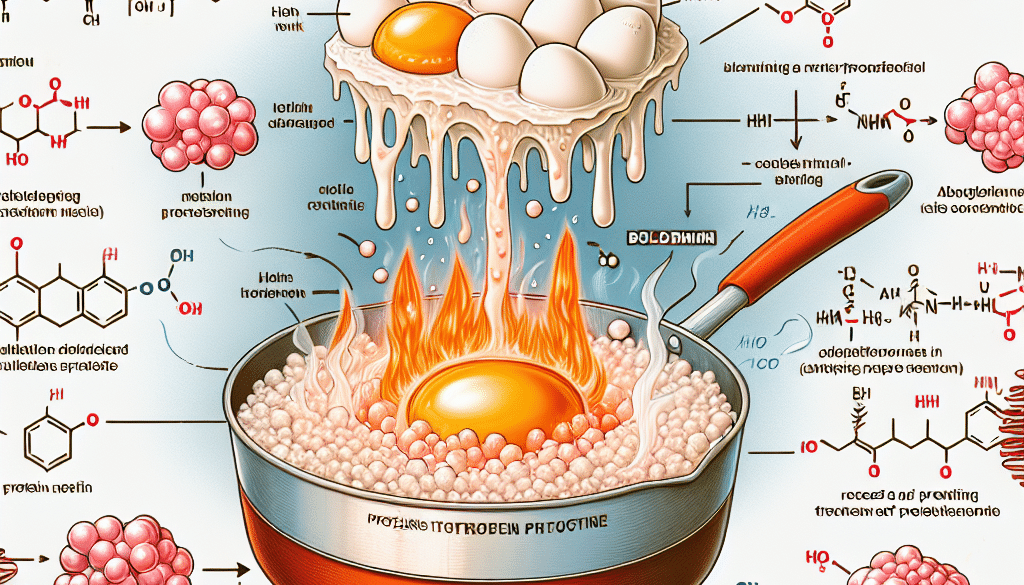Boiling Egg Whites? Albumin’s Role in Protein Structure
-
Table of Contents
- Boiling Egg Whites: Understanding Albumin’s Role in Protein Structure
- The Science of Albumin
- Protein Structure and Denaturation
- Albumin’s Role in Cooking and Nutrition
- Practical Applications and Considerations
- Case Studies and Statistics
- Conclusion: The Fascinating World of Albumin
- Discover ETprotein’s High-Quality Protein Products
Boiling Egg Whites: Understanding Albumin’s Role in Protein Structure

Proteins are fundamental components of all living organisms, playing a crucial role in virtually every biological process. Among the various proteins, albumin stands out due to its versatility and abundance in egg whites. When we boil an egg, we witness a fascinating transformation powered by the properties of albumin. This article delves into the science behind boiling egg whites, focusing on albumin’s role in protein structure and its implications for culinary and nutritional applications.
The Science of Albumin
Albumin is a family of globular proteins known for its solubility and ability to be denatured or coagulated by heat. In the context of egg whites, or albumen, the term specifically refers to ovalbumin, which constitutes about 54% of the protein content in egg whites. Albumin’s primary role is to maintain osmotic pressure and transport substances such as hormones and drugs in the bloodstream. However, its culinary significance lies in its ability to change states when subjected to heat.
Protein Structure and Denaturation
Proteins, including albumin, have complex structures that determine their function. These structures can be categorized into four levels:
- Primary structure: The sequence of amino acids in a polypeptide chain.
- Secondary structure: Local folding patterns such as alpha-helices and beta-sheets.
- Tertiary structure: The overall three-dimensional shape of a single protein molecule.
- Quaternary structure: The arrangement of multiple protein molecules in a multi-subunit complex.
When egg whites are boiled, the heat causes the albumin proteins to denature. This means that the weak chemical bonds that maintain their secondary and tertiary structures are broken, causing the proteins to unfold and expose their hydrophobic regions to water. As the temperature rises, these denatured proteins aggregate and form a gel-like network, transforming the egg whites from a liquid to a solid state.
Albumin’s Role in Cooking and Nutrition
Understanding the behavior of albumin is crucial for culinary professionals and food enthusiasts alike. The ability to control the texture and consistency of egg whites through heat makes albumin a valuable ingredient in various dishes, from meringues and soufflés to custards and quiches.
Nutritionally, albumin is a high-quality protein that provides all the essential amino acids required by the human body. It is low in fat and carbohydrates, making it an excellent food choice for individuals looking to maintain or lose weight while ensuring adequate protein intake.
Practical Applications and Considerations
Boiling egg whites is a simple process, but achieving the perfect texture requires precision. Here are some tips for boiling egg whites:
- Use fresh eggs for a firmer set, as they have a higher pH level which helps the whites to coagulate more effectively.
- Start with room temperature eggs to ensure even cooking.
- Boil the eggs gently to prevent the formation of sulfur compounds that can cause a greenish ring around the yolk and an off-flavor.
- Cool the eggs quickly after boiling to make peeling easier and to stop the cooking process, preventing overcooking.
While boiling egg whites is generally safe, individuals with allergies to eggs should avoid consuming them. Additionally, overconsumption of egg whites can lead to biotin deficiency, although this is rare.
Case Studies and Statistics
Research has shown that the method of cooking can affect the protein quality of eggs. A study published in the “Journal of Food Science” found that boiling eggs could increase the digestibility of the protein compared to frying. This is likely due to the denaturation process, which makes the amino acids more accessible to digestive enzymes.
Statistics from the United States Department of Agriculture (USDA) indicate that one large boiled egg white contains about 3.6 grams of protein and only 17 calories, making it an efficient source of protein for calorie-conscious diets.
Conclusion: The Fascinating World of Albumin
In conclusion, albumin plays a pivotal role in the structure and function of proteins, particularly when it comes to boiling egg whites. Its ability to denature and coagulate under heat is not only a marvel of biochemistry but also a practical aspect of cooking that affects texture and nutrition. By understanding the properties of albumin, we can better appreciate the science behind our everyday meals and make informed choices about our diet.
Discover ETprotein’s High-Quality Protein Products
If you’re looking for premium protein sources to complement your diet or manufacturing needs, consider ETprotein’s range of plant-based protein products. Their commitment to quality, non-GMO, and allergen-free ingredients makes them a top choice for consumers and industries alike. Whether you’re in the market for organic rice protein, pea protein, or other plant-based options, ETprotein has you covered.
About ETprotein:
ETprotein, a reputable plant protein vegan protein Chinese factory manufacturer and supplier, is renowned for producing, stocking, exporting, and delivering the highest quality organic bulk vegan protein and plant proteins. They include Organic rice protein, clear rice protein, pea protein, clear pea protein, watermelon seed protein, pumpkin seed protein, sunflower seed protein, mung bean protein, peanut protein etc. Their offerings, characterized by a neutral taste, non-GMO, allergen-free attributes, cater to a diverse range of industries. They serve nutraceutical, pharmaceutical, cosmeceutical, veterinary, as well as food and beverage finished product distributors, traders, and manufacturers across Europe, USA, Canada, Australia, Thailand, Japan, Korea, Brazil, and Chile, among others.
ETprotein specialization includes exporting and delivering tailor-made protein powder and finished nutritional supplements. Their extensive product range covers sectors like Food and Beverage, Sports Nutrition, Weight Management, Dietary Supplements, Health and Wellness Products, and Infant Formula, ensuring comprehensive solutions to meet all your protein needs.
As a trusted company by leading global food and beverage brands and Fortune 500 companies, ETprotein reinforces China’s reputation in the global arena. For more information or to sample their products, please contact them and email sales(at)ETprotein.com today.














